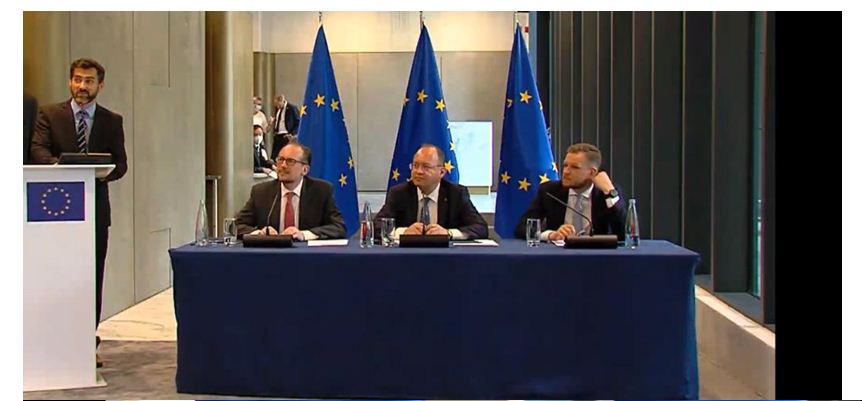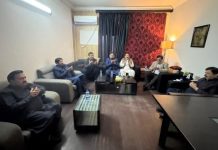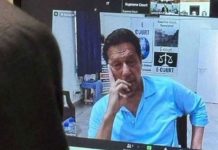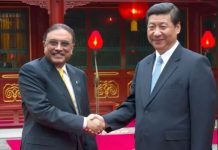This was the first joint visit to the Eastern Neighbourhood by a group of European Foreign Ministers, coordinated with and mandated by the High Representative, Josep Borrell
News Desk
BUCHAREST: Romanian Foreign Minister Bogdan Aurescu issued a statement after his visit to Georgia, Armenia and Azerbaijan along with his counterparts from Austria and Lithuania. Here is the text of his statement, ‘From the outset, I would like to express a well-deserved word of appreciation for our partners from Georgia, Azerbaijan and Armenia, for their warm hospitality and the excellent organization of this tour through the South Caucasus, a region having strategic importance for the European Union.
Also, I would like to add our gratitude to the EU Delegations in Baku, Yerevan and Tbilisi, together with our national diplomatic missions on the ground, for putting together, in a very short time, a very dense, consistent schedule and for making the necessary arrangements for our tour.
This is the first joint visit to the Eastern Neighbourhood by a group of European Foreign Ministers, coordinated with and mandated by the High Representative, Josep Borrell.
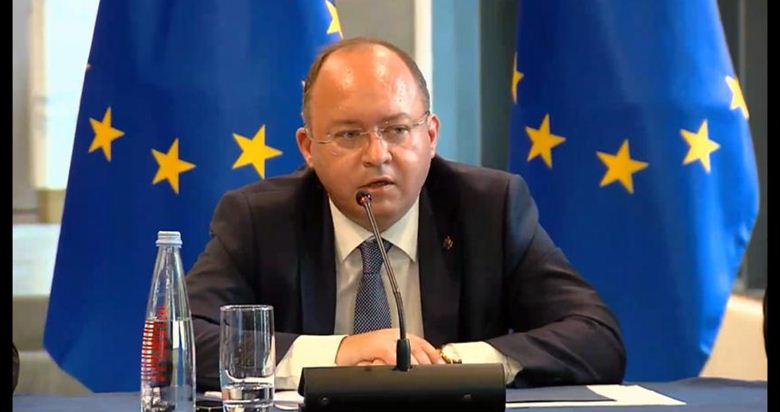
I believe it was a very successful endeavour, especially as the challenges faced by our Eastern Partners are high on the EU agenda. This tour allowed us to pass a message of European solidarity and engagement, on behalf of the EU and the Member States. At the same time, we conveyed a message of the EU commitment to prioritize the security, stability and prosperity of all three Southern Caucasus countries we visited. And the determination for the European Union to be more and more actively involved in the process of settling the protracted conflicts in this region, which has a geostrategic importance for the EU as a whole.
Now a few words on the regional challenges.
I recall that, on behalf of Romania, already last year, in October, I promoted the idea, which was supported by ten other EU Ministers of Foreign Affairs, of having an in-depth discussion at EU level on protracted conflicts, which affect many of the countries in the Eastern Neighborhood and have been hindering these countries’ development perspectives for decades.
As everyone can see, these conflicts have an extremely negative impact on the regional security and stability. They hamper the socio-economic progress and generate difficulties for the people living in the affected areas. In this context, it is particularly important to mobilize the EU’s attention on these issues, to identify the best ways of using EU instruments and cooperation formats to support the affected countries.
We had insightful discussions last month, at the Gymnich meeting in Lisbon, when we have decided to strengthen our political support to the Eastern Partners. And this tour is, in fact, the first concrete follow-up to the discussion we had in Lisbon.
We encouraged our partners in the South Caucasus countries to make best use of the instruments provided by the Eastern Partnership framework, in order to strengthen regional cooperation, to the benefit of peace and prosperity and, also, ultimately, to the benefit of the people. So in all three countries, we have expressed support for the possible creation of a regional format, including all three of them, with EU facilitation and support.
In the timely discussions with our interlocutors in all three capitals, I have reaffirmed the view on the importance of their active involvement in the perspectives of the upcoming Eastern Partnership Summit. In view of this Summit, it is essential to endorse a common, ambitious vision on the Eastern Partnership, for the coming years.
While maintaining the inclusiveness of the Partnership, we should be ready to reward the efforts of our most ambitious and committed Partners, such as Georgia, but also Ukraine and Republic of Moldova. This is why we advocate for a flexible Eastern Partnership, with a fine balance between inclusivity and differentiation.
From Romania’s perspective, as I proposed at European level, I will promote the need to develop a security dimension within the Eastern Partnership.
We had, in all three capitals, substantial and very productive talks with our high-level interlocutors. In Azerbaijan, we met the President and the Foreign Minister. In Armenia – the Acting Prime Minister and the President and here, in Tbilisi – the Prime Minister and our colleague, the Foreign Minister, David Zalkaliani.
We have also paid a visit to the Administrative Boundary Line, where we were briefed by the EUMM staff on the situation on the ground.
And, in this context, I would like to reiterate our strong support for the territorial integrity and sovereignty of Georgia and to reassure that Romania will continue to contribute with personnel to the EU Monitoring Mission. We already have 23 monitors on the ground.
In Azerbaijan, we have expressed the fact that we consider that this country has a key role in the stability and prosperity of the South Caucasus and expressed the hope that the new EU-Azerbaijan Agreement, currently under negotiation, would be concluded swiftly, and thus providing an updated, modern framework to further guide our cooperation. And we have agreed, with President Aliyev, to resume, swiftly, the negotiation process. We hope that this agreement will be concluded by the end of this year.
In Armenia, I have congratulated Prime Minister Pashinyan for his party’s victory in last Sunday’s parliamentary elections and commended the good organization and the democratic character of the elections, as highlighted by OSCE/ODIHR and other international observation missions. I highlighted my belief that further modernization and democratization of the country, through a continuation of the reform process already initiated by the previous Government, should become the new strategic objective for Armenia, capable of uniting the efforts of all political forces, to the benefit of the Armenian people.
In both countries, Azerbaijan and Armenia, we had in-depth talks on the current situation and on the perspectives of moving forward, following the last year’s military confrontation. We called for a constructive spirit and for rebuilding trust, because confidence-building measures, such as those related to the release of all detainees and the handing over of all maps of mined areas, remain a priority. EU is ready to continue to help and support such evolutions. So, we underlined the EU’s readiness to provide support, upon request, on all matters that might lead to a negotiated, sustainable and lasting settlement of all pending issues. I have underlined the need for reconciliation between the two societies, which is a process which will take probably some time and a lot of efforts, but there is no other option. We have also discussed about many other important components of the settlement. I will not go now into details about them.
Now, some words about our activity here in Tbilisi.
I have congratulated Georgia on the progress in the implementation of the Association Agreement. We stand ready to further support the political association and economic integration of Georgia with the European Union.
And I have also underlined that an inclusive political environment and further modernization and democratization are important for Georgia’s European agenda. On this note, I welcomed the decision of the opposition forces to accept their mandates in the new Parliament, as a first step towards normalization of the internal situation. At the same time, we consider that all political forces need to sign the April political agreement.
And I also welcomed Georgia’s approach towards peacefully engaging the population in the two Georgian regions affected by the protracted conflicts.
Last but not least, I would like to reiterate Romania’s strong support for the European and Euro-Atlantic aspirations of Georgia.
To conclude, I would like to state again that this was a very successful diplomatic tour in the South Caucasus and we will inform our EU colleagues and the High Representative, Josep Borrell about the results during the next Foreign Affairs Council meeting on the 12th of July.
As you know, our joint delegation left together from Bucharest and we are now returning together to the capital of Romania. This has shown that Romania is pro-actively engaged in the region and that we have a well-acknowledged contribution at the European level regarding our Eastern Neighbourhood and our partners. And I am glad that, in this way, we can come with a solid contribution to the realization of European foreign policy.
I am concluding by saying that, for Romania, the fact that we managed to introduce this topic high on the agenda, the topic of protracted conflicts in our Eastern Neighbourhood, represents a true diplomatic success, because our country supports the stability and security of the states in the Eastern Partnership and, at the same time, because the settlement of these conflicts represents, for us, a strategic priority objective.
We will continue to advocate for closer ties with the EU and for more EU involvement in the region, to the benefit of the future perspectives of all three countries and especially to the benefit the citizens, who, I hope, were reassured these days about the EU’s support’.

